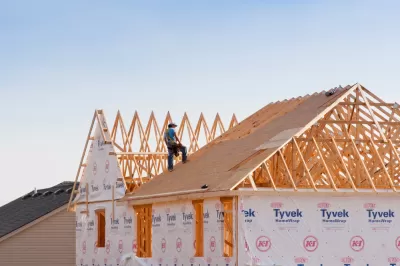It is undeniable that some houses are being bought up by big corporations—but the negative results of such "financialization" actually prove that the law of supply and demand still applies to housing.

A recent Washington Post article proclaimed that Wall Street investors are buying up subdivisions, turning houses into rental properties, and treating tenants unethically. On one of my listservs, NIMBYs and PHIMBYs* are using this reality as evidence that market-rate housing can never bring down rents because of this "financialization" of real estate. (Although different people use the term "financialization" to mean different things, my sense is that in the context of land use policy, the most common usage of the term is that "rich people are buying up real estate and that's bad.")
But if you read the story more carefully, it seems perfectly consistent with the key belief of the pro-housing YIMBY movement: that the law of supply and demand does in fact apply to real estate. The Washington Post article complains that out-of-town investors are "outbidding middle-class homeowners." In other words, demand for housing has increased (because corporations decided to buy houses), thus prices are going up. And if demand affects prices, it logically follows that supply affects houses as well.
Having said that, rapid changes in housing costs do suggest that it is sometimes difficult for supply to shift along with demand. Why? Because demand may change far more rapidly than supply. For example, in Midtown Manhattan where I live, median asking rents for two-bedroom apartments increased from $3950 to $4300 between December 2018 and December 2019, then plunged to $3400 in January 2021, then increased to $4700 in October 2021.
Unfortunately, in the United States supply rarely increases so rapidly. Even where building a house complies with existing zoning, construction of just one house takes months. And government regulation may add months or even years to this process: often, a builder must get a rezoning and/or subdivision approval, and then spend years going through public hearings, buying off potential opponents with concessions, and even going to court to fight off those opponents.** As a result, a demand shock will not immediately be met by increased supply. This reality may explain why, even in markets far more permissive than New York, prices rise with demand. For example, in Austin (one of the nation's fastest growing cities), prices have increased by 25 percent over the past year.
It seems to me that the relationship between demand and supply is a bit like the relationship between coronavirus and countermeasures such as vaccines: just as the virus mutates more rapidly than scientists can create appropriate vaccines, demand changes more rapidly than developers can create housing to meet the demand.
What can we do about this? Americans have three options. We can set the rules of the political game so that supply can rise as rapidly as possible to meet demand, which at least mitigates the supply/demand gap. Or we can raise taxes to build so much public housing that supply will always exceed demand. Or we can just continue to live with the "virus" of rising rents and housing costs—a result that is quite convenient for people who already own condos and houses, but of course is less convenient for those of us who are too poor or too mobile to do so.
*If you don't want to read the links, the meaning of the acronyms above is as follows: NIMBY= Not In My Back Yard (that is, "don't build housing anywhere near me, whether it is private or public"), PHIMBY= Public Housing In My Back Yard (that is, "government-subsidized housing is good but market-rate housing is not so good"), and YIMBY= Yes In My Back Yard (that is, "housing is good").
**This is one reason why the common NIMBY argument that "my city always approves rezonings" is misleading. Even if a city approves 100 percent of upzoning requests, the delay caused by the rezoning process may ensure that it takes a long time for housing to get built, which means that supply may increase at a glacial pace.

Trump Administration Could Effectively End Housing Voucher Program
Federal officials are eyeing major cuts to the Section 8 program that helps millions of low-income households pay rent.

Planetizen Federal Action Tracker
A weekly monitor of how Trump’s orders and actions are impacting planners and planning in America.

Ken Jennings Launches Transit Web Series
The Jeopardy champ wants you to ride public transit.

Crime Continues to Drop on Philly, San Francisco Transit Systems
SEPTA and BART both saw significant declines in violent crime in the first quarter of 2025.

How South LA Green Spaces Power Community Health and Hope
Green spaces like South L.A. Wetlands Park are helping South Los Angeles residents promote healthy lifestyles, build community, and advocate for improvements that reflect local needs in historically underserved neighborhoods.

Sacramento Plans ‘Quick-Build’ Road Safety Projects
The city wants to accelerate small-scale safety improvements that use low-cost equipment to make an impact at dangerous intersections.
Urban Design for Planners 1: Software Tools
This six-course series explores essential urban design concepts using open source software and equips planners with the tools they need to participate fully in the urban design process.
Planning for Universal Design
Learn the tools for implementing Universal Design in planning regulations.
Heyer Gruel & Associates PA
Ada County Highway District
Institute for Housing and Urban Development Studies (IHS)
City of Grandview
Harvard GSD Executive Education
Toledo-Lucas County Plan Commissions
Salt Lake City
NYU Wagner Graduate School of Public Service



























